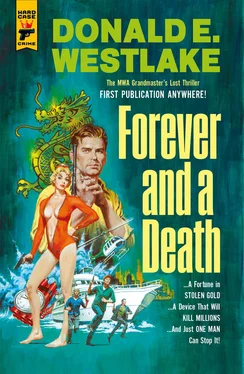He wasn’t really aware of the charged silence in the room until Fairchild broke it by saying, “Mr. Diedrich? What have you done?”
Then Jerry realized what he’d said, what he’d implied, and he lowered his hands, showing his flushed face, and said, “No no no! I mean — we shouldn’t have pressed him so hard, I had no idea he...” Turning, he said, “Luther, you know what I mean!”
Luther said to Fairchild, “Did he leave a note?”
“Hard to say,” Fairchild said.
Luther gave a small smile of disbelief and said, “Inspector, how can it be hard to say if he left a note?”
“On the memo pad beside his bed,” Fairchild explained, “in Chinese, was his wife’s name, and ‘I love you,’ nothing more. If it’s a suicide note, it’s certainly an ambiguous one. The other possibility is that he was just starting a letter to his wife when he was interrupted by his murderer.”
Jerry said, “Oh, my God! You don’t think we—”
Luther, gently but firmly, said, “Stop, Jerry. The inspector doesn’t think we have anything to do with it at all.”
“Well, if it was suicide, you did,” Fairchild said. “In a way. You made it clear to Captain Zhang that the questions would only continue, and only get worse.” He tapped one of the pieces of paper that had been delivered to his desk. “Miss Baldur’s parents have confirmed to the Sydney police your account of their meeting with Captain Zhang. It is clear he did speak English, and it is clear he pretended not to be able to, because he was afraid to be questioned on the subject of Miss Baldur. Now that Miss Baldur is alive, rather than dead, we can understand why he was afraid.”
“He felt guilty,” Jerry said, feeling mixed emotions himself. “He was guilty.”
Fairchild tapped a fingernail on his desk, then said, “You may all consider yourselves lucky that Captain Zhang became as desperate as he did, or that someone else became that desperate, because the captain’s death is, so far, absolutely the only confirmation we have of your story. Whether it’s suicide or murder, it effectively eliminates the weakest link.”
Luther said, “Inspector, you still think it might be murder?”
“We can’t rule that out, not yet. There was no sign of struggle. There was that note, however ambiguous. There was the timing, immediately after you two questioned him about Miss Baldur. We would, however, prefer not to be too hasty in our conclusions. There’s no need to close that issue at once.”
A policeman had brought in another slip of paper while Fairchild was talking, and placed it on his desk. Fairchild looked at it, raised an eyebrow, and looked back up at Kim. “Well, we seem to have another potential corroboration of your story. Looked at a certain way.”
Kim said, “What? What’s happened?”
“This morning,” Fairchild told her, “less than an hour ago, from an undisclosed location, Richard Curtis announced he’d been misinformed about George Manville, that Manville was innocent of the charges brought against him two days ago. All charges have been dropped and Manville is once again employed by Curtis Construction. This was a sort of press conference, a teleconferencing hookup with a number of prominent business newspapers and television outlets, including CNN, which is where we got it. George Manville is no longer charged with any crime.” Fairchild tapped the piece of paper. “It would seem, Miss Baldur,” he said, not without sympathy, “that your friend is Richard Curtis’s friend now.”
After lunch, Curtis went riding for an hour with Albert Farrelly. Albert showed him the new swales that had been bulldozed since he’d been here last.
“It’s terrific work, Albert,” Curtis said. “First-rate work.”
They rode on, and Curtis said, “Albert, you know that George Manville is staying here for a week or two.”
“Yes, sir, I do,” Albert said. “We’ll take care of him, make him feel at home.”
“Do that. But the truth is, Albert,” Curtis said, as they rode side by side, quartering westward now, looping toward home, “he’s not actually a guest here so much as a prisoner — though he doesn’t know it. Or I hope he doesn’t know it.”
Surprised, Albert said, “Prisoner? I thought he was a friend of yours. Isn’t he who you were talking about, on the TV?”
“He is. I had to give him that, Albert,” Curtis explained, “because he’s in a position where he could make a lot of trouble for me, over the next few weeks, if he really wanted to. And I think he may want to.”
“Good heavens, Mr. Curtis, why?”
“It’s hard to know why a man turns against you,” Curtis said. “I thought we worked well together. It may be he thought I was taking too much credit, or not paying him well enough, or who knows what. He knows my plans, a big construction job coming up, and he could make a great deal of trouble for me if he decided to. That’s why I want him to stay here. He agreed, all right, but I have to tell you I don’t entirely trust him.”
Solemnly, Albert said, “Mr. Curtis, what do you want me to do?”
“Keep an eye on him. Don’t let him have any of the vehicles, for any reason at all. It would be better not to let him near a phone; remove them all, except in your office and bedroom, and keep those doors locked.”
“Yes, sir.”
“And if you think he’s planning something he shouldn’t,” Curtis went on, “those three fellows that brought him here, that are over in the spare barracks, they’ll take care of things for you. Just talk to Morgan Pallifer. But not unless there’s something you don’t think you can handle by yourself.”
“Those fellas,” Albert said, and he couldn’t entirely keep a tinge of distaste from his voice, “aren’t the sort I’m used to, Mr. Curtis.”
“I feel the same way about them,” Curtis assured him. “But sometimes we have to use the tools at hand. One or more of them may leave for a while early next week, but most of the time they’ll be here, and we’ll make sure Manville knows it. Oh, and if Morgan wants to use the phone, let him use the one in the office.”
“Yes, sir.” Albert managed a shaky laugh. “Even in a paradise like this,” he said, “life can get complex can’t it?”
“It surely can,” Curtis said.
Leaving the horses with Albert, Curtis walked over to the building they called the spare barracks, a long low adobe shoebox of a structure, with a verandah on one long side. Entering the building, Curtis heard the sound of the TV, followed it, and found the three men sprawled on sofas, watching an old MGM musical, the bright colors looking bruised on the screen. “Morgan,” Curtis said, and gestured, and Pallifer got to his feet, glanced one last time at the girls dancing in white crinoline, and came out of the room with him.
“We’re off in a few minutes,” Curtis told him, as they walked together down the hall. “Now, I’ve got my agreement with Manville, and I think he’s the kind will stick to it, but in case he does try to leave, you’ll stop him.”
As they went out the wide door to the verandah, Pallifer said, “How hard do I stop him?”
They stood under the verandah roof. Curtis squinted across at the adobe main house, dun-colored, disappearing into the landscape despite its two-story height. “You don’t kill him,” he said, “unless you absolutely have to. But if he makes trouble... let me put it this way. I don’t need him to be able to walk, I just need him to be able to think.”
“For two weeks maximum, you say.”
Curtis looked at Pallifer, the leathery face, the cold sharp eyes, the bony brow. What a nasty son of a bitch, Curtis thought. I’m glad I own him, and nobody else. “When I’m finished what I’m doing,” he said, “you and Manville can work out whatever problems you two might have, makes no difference to me.”
Читать дальше







![Дональд Уэстлейк - Enough [A Travesty (novel) and Ordo (novelette)]](/books/416846/donald-uestlejk-enough-a-travesty-novel-and-or-thumb.webp)
